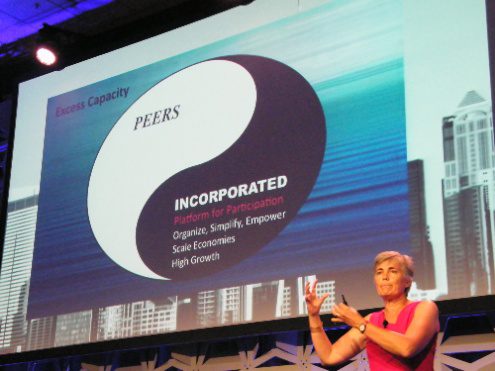Datamation content and product recommendations are
editorially independent. We may make money when you click on links
to our partners.
Learn More
SEATTLE – Global warming, income inequality and access to opportunity are three of the great challenges of our time, and they are three challenges where open source peer platforms could play a role.
Speaking at the Linuxcon conference here, Robin Chase, founder of Zipcar, discussed her views on how an idea she refers to as ‘Peers Inc’ could quite literally save all human life on planet Earth.
With Zipcar, Chase said that she is trying to solve the challenge of resource utilization. With cars, there historically were only two ways to get a car, you could buy one or you could rent. With a car purchase the asset is typically only used five percent of the time, while with rentals people could only rent in 24 hours bundles.
“Either way you always had to buy more than you really needed,” Chase said. “I figured if you could just pay for what you use, the economics would transform the world.”
Chase explained that the key is about making it easier to share a car in less time than it takes to rent a car. She added that with car rental companies, many consumers also distrust them and there is an antagonistic relationship.
“With Zipcar, we make it more collaborative and we think of consumers as co-creators,” Chase said.
The Peers Inc model leverages excess capacity, people and platform in order to scale. The Internet has lowered transaction costs and now local customization can more easily be engineered.
The Peers Inc. model brings in the diversity of a massive number of users and then leverages the power of platform to enable participation.
“The power of peers comes together with platform in a yin/yang relationship and swims in the sea of excess capacity,” Chase said.
The peers model of scaling delivers diversity, innovation, resilience and redundancy, while the inc platform side provides the economies of scale.
Beyond the economic benefits for creators, Chase said that the Peers Inc model can also be a tool to save the planet. Chase noted that global warming is an increasingly growing problem and to date solutions for global warming have been mostly linear.
“With Peers Inc. we can defy the laws of physics,” Chase said. “We can build the largest hotel chain in the world with Airbnb in just four years.”
Additionally with Peers Inc. creators can tap the power of exponential learning. For example, Chase said that DuoLingo now has 90 million users, with 45 million of those users learning languages that DuoLingo users themselves contributed to the platform.
“Industrial capitalism is dead because the Internet exists and sharing is a better way of extracting more value,” Chase said.
Chase emphasized that shared network assets always deliver more value than closed assets and more networked minds are always greater in number than propriety minds. She added that the benefits of shared open assets are always larger that any of the problems of open assets.
“Whenever I participate I always get more than I give,” Chase said.
When it comes to figuring out how to address climate change, how to deal with the issue of income distribution and how to increase access to opportunity to build a new sustainable equitable economy, Chase is adamant that an open model of peer-based platform is the way forward.
“Peers Inc with open source can help to build the world we want to live in,” Chase said.

Zipcar founder Robin Chase
Sean Michael Kerner is a senior editor at Datatmation and InternetNews.com. Follow him on Twitter @TechJournalist
-
Huawei’s AI Update: Things Are Moving Faster Than We Think
FEATURE | By Rob Enderle,
December 04, 2020
-
Keeping Machine Learning Algorithms Honest in the ‘Ethics-First’ Era
ARTIFICIAL INTELLIGENCE | By Guest Author,
November 18, 2020
-
Key Trends in Chatbots and RPA
FEATURE | By Guest Author,
November 10, 2020
-
Top 10 AIOps Companies
FEATURE | By Samuel Greengard,
November 05, 2020
-
What is Text Analysis?
ARTIFICIAL INTELLIGENCE | By Guest Author,
November 02, 2020
-
How Intel’s Work With Autonomous Cars Could Redefine General Purpose AI
ARTIFICIAL INTELLIGENCE | By Rob Enderle,
October 29, 2020
-
Dell Technologies World: Weaving Together Human And Machine Interaction For AI And Robotics
ARTIFICIAL INTELLIGENCE | By Rob Enderle,
October 23, 2020
-
The Super Moderator, or How IBM Project Debater Could Save Social Media
FEATURE | By Rob Enderle,
October 16, 2020
-
Top 10 Chatbot Platforms
FEATURE | By Cynthia Harvey,
October 07, 2020
-
Finding a Career Path in AI
ARTIFICIAL INTELLIGENCE | By Guest Author,
October 05, 2020
-
CIOs Discuss the Promise of AI and Data Science
FEATURE | By Guest Author,
September 25, 2020
-
Microsoft Is Building An AI Product That Could Predict The Future
FEATURE | By Rob Enderle,
September 25, 2020
-
Top 10 Machine Learning Companies 2020
FEATURE | By Cynthia Harvey,
September 22, 2020
-
NVIDIA and ARM: Massively Changing The AI Landscape
ARTIFICIAL INTELLIGENCE | By Rob Enderle,
September 18, 2020
-
Continuous Intelligence: Expert Discussion [Video and Podcast]
ARTIFICIAL INTELLIGENCE | By James Maguire,
September 14, 2020
-
Artificial Intelligence: Governance and Ethics [Video]
ARTIFICIAL INTELLIGENCE | By James Maguire,
September 13, 2020
-
IBM Watson At The US Open: Showcasing The Power Of A Mature Enterprise-Class AI
FEATURE | By Rob Enderle,
September 11, 2020
-
Artificial Intelligence: Perception vs. Reality
FEATURE | By James Maguire,
September 09, 2020
-
Anticipating The Coming Wave Of AI Enhanced PCs
FEATURE | By Rob Enderle,
September 05, 2020
-
The Critical Nature Of IBM’s NLP (Natural Language Processing) Effort
ARTIFICIAL INTELLIGENCE | By Rob Enderle,
August 14, 2020
SEE ALL
ARTICLES








